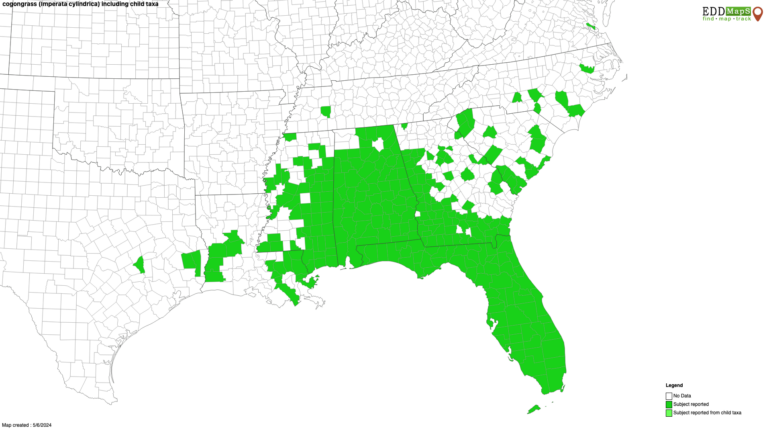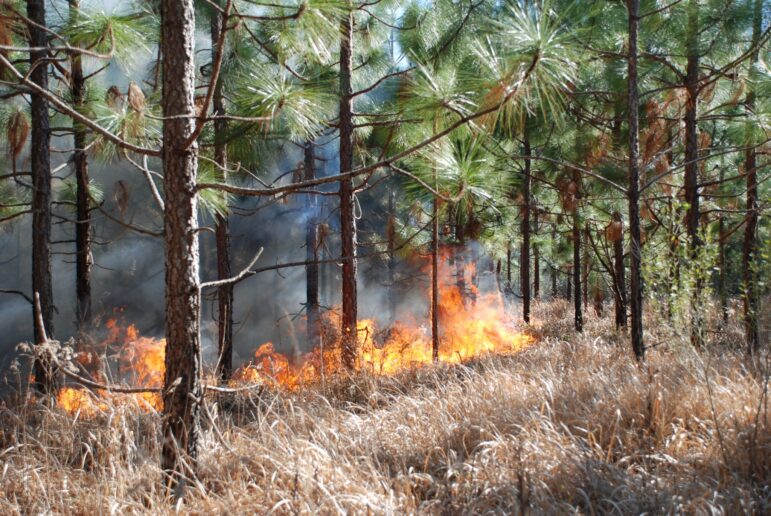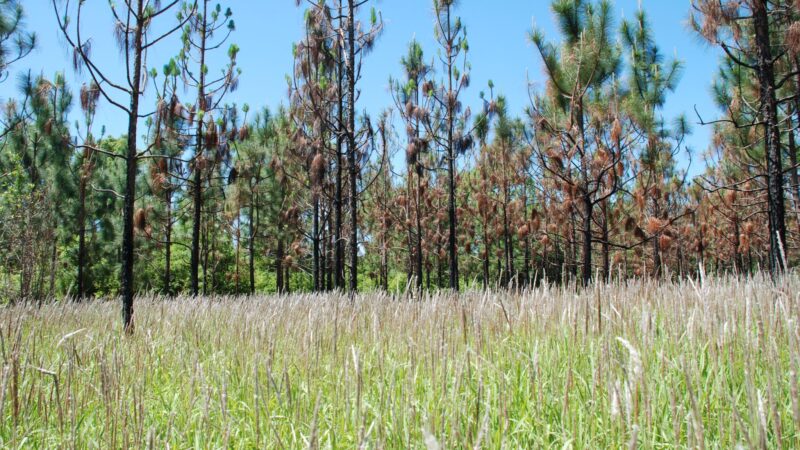This spiky-stemmed invasive grass is taking over Alabama
On his family’s land in rural Etowah County, Nick Jackson grows loblolly pine trees among a diverse range of vegetation, from oak trees to blueberry bushes.
But in 2016, a new species popped up on the property.
“We were doing site prep for planting loblolly pine, and we noticed a circular pattern of grass that was different in color to the surrounding area,” Jackson said. “That’s what triggered us to investigate a little bit further. And it was cogongrass.”
Cogongrass is an invasive plant that easily spreads and aggressively crowds out native species. And despite statewide mitigation efforts, it’s taking over Alabama.
Not your typical grass
At first glance, there’s nothing especially unique about cogongrass. Its thin green leaves stretch several feet high and produce fluffy, white dandelion-like seeds in the summer. The grass grows in thick, circular patches with intricate underground webs of spiky stems known as rhizomes.
“It’s so thick, it chokes out all the natural plants and grasses that the ecosystem is dependent on. So this has a large impact on the diversity and health of the ecosystem,” Jackson said.
Where cogongrass grows, few species survive. No crops. No timber. And the grass is really hard to get rid of.
“It’s one of the top ten worst weeds in the world, and it’s a weed everywhere,” said Nancy Loewenstein, an extension specialist with Auburn University.
Loewenstein has studied cogongrass for nearly two decades. She said the species entered the US in the early 1900s through the port of Mobile and spread under the radar for decades.
“For the longest time it can appear that you don’t really have a problem,” Loewenstein said. “And then the population gets to such a point where it starts spreading really rapidly. And all the sudden it’s like, ‘Good grief. This stuff is everywhere. How’d that happen?’”
Alabama is at that point.
What doesn’t kill it, makes it stronger
Today, cogongrass is found in 62 of Alabama’s 67 counties and has especially saturated the southern part of the state.

Part of what makes cogongrass such a well-adapted species is that it evades many mitigation strategies.
Animals don’t eat the grass, because it’s difficult to digest. Landowners can’t mow it away, because that could stir up the underground rhizomes, which can break off and sprout new cogongrass infestations.
Burning the plant is also off the table.
“It’s a fire-adapted species, so fire actually contributes to its spread and its vigor,” Loewenstein said.
The most effective way to get rid of cogongrass is treating it with herbicides, which can be a controversial approach, according to Emma McKee, invasive species coordinator with the Longleaf Alliance.
McKee works with landowners in southern Alabama who face cogongrass infestations and said sometimes they are against spraying chemicals on their property.
“But by the end of my 10-minute spiel about how intense this plant is, they’re on board with using the herbicide,” McKee said.

Drawing a line in the sand
When applied carefully and correctly, landowners like Jackson said the treatment is worth it.
In 2022, Jackson signed up with a new program offered by the Alabama Forestry Commission (AFC). For three years, the agency sends people to his property to spray the cogongrass infestation once a year at no charge.
“They’ve done a great job,” Jackson said. “They (the AFC) can control how they spray very precisely. They limit any overspray or undesirable mortality of the native vegetation.”
Jackson said the herbicides have helped kill some of the cogongrass patch, and have stopped the species from expanding further on his property.
That’s likely the best outcome, according to Loewenstein. She said across much of south Alabama, cogongrass has spread so much, it’s unlikely landowners will be able to get rid of it. But there is still time to protect land in the northern part of the state.
“We know how to not spread it,” Loewenstein said. “So if we can make a line in the sand … let’s keep it from spreading further.”
Mideast clashes breach Olympic truce as athletes gather for Winter Paralympic Games
Fighting intensified in the Middle East during the Olympic truce, in effect through March 15. Flights are being disrupted as athletes and families converge on Italy for the Winter Paralympics.
A U.S. scholarship thrills a teacher in India. Then came the soul-crushing questions
She was thrilled to become the first teacher from a government-sponsored school in India to get a Fulbright exchange award to learn from U.S. schools. People asked two questions that clouded her joy.
Sunday Puzzle: Sandwiched
NPR's Ayesha Rascoe plays the puzzle with WXXI listener Jonathan Black and Weekend Edition Puzzlemaster Will Shortz.
U.S.-Israeli strikes in Iran continue into 2nd day, as the region faces turmoil
Israel said on Sunday it had launched more attacks on Iran, while the Iranian government continued strikes on Israel and on U.S. targets in Gulf states, Iraq and Jordan.
Trump warns Iran not to retaliate after Ayatollah Ali Khamenei is killed
The Iranian government has announced 40 days of mourning. The country's supreme leader was killed following an attack launched by the U.S. and Israel on Saturday against Iran.
Iran fires missiles at Israel and Gulf states after U.S.-Israeli strike kills Khamenei
Iran fired missiles at targets in Israel and Gulf Arab states Sunday after vowing massive retaliation for the killing of Supreme Leader Ayatollah Ali Khamenei by the United States and Israel.








